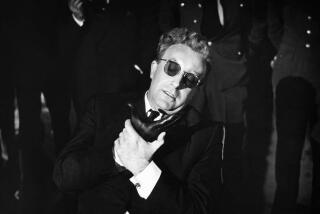Actor-Author Sterling Hayden Dies
- Share via
SAUSALITO — Sterling Hayden, actor, war hero and author who led a life of contradictions, died quietly at his home today of cancer. He was 70 and had been fighting the illness for several years.
Hayden was a movie star who hated movie-making, an introspective brooder who played uncomplicated men of silent strength, a 6-foot-5 cloak-and-dagger war hero who became a pacifist, a scion of wealth who seemed happiest as a sailor.
His blond good looks had box-office appeal on the screen, although critics called his acting wooden. On the other hand, his books received critical praise but were not best-sellers.
He was a repentant former communist who said he despised himself for cooperating with congressional investigators in the 1950s.
‘Hated Acting’
He once said he “spent a lifetime selling out. I always hated acting but I kept on acting . . . a commuter on a tinsel train.”
Hayden appeared in such films as “The Asphalt Jungle,” “The Godfather” and “Dr. Strangelove,” in which he played Gen. Jack D. Ripper, whose worry about polluting his bodily fluids leads to nuclear war.
A former sailing ship captain who was an instant success at the box office when he began appearing in “B” movies in 1940, he quit after two films because he was “restless” to return to his great love--the sea. He became a star twice more, and abandoned his career both times to roam the oceans on a sailboat.
The outbreak of World War II gave Hayden another excuse to leave Hollywood, even though he had just begun getting starring roles.
Joined Marines
Using his real name, John Hamilton, he joined the Marine Corps and volunteered for the Office of Special Services, the spy-and-guerrilla unit that was the ancestor of the CIA.
He was assigned to run guns and supplies to Tito’s guerrillas in Yugoslavia, using his maritime skills to slip across the Adriatic sea at night in sailboats, evading German patrol boats.
In the late 1950s, he defied court custody orders and sailed with his children to Tahiti. The voyage inspired his 1963 autobiography, “Wanderer.”
In 1976 he published a novel, “Voyage,” which a Time magazine reviewer called “a somber study of the human condition.”
Condemned His Cooperation
His admiration for the Yugoslav partisans he fought with in the war moved him to join the American Communist Party for a brief period in 1946. When called to testify before the House Committee on Un-American Activities in 1951, he answered questions about other members of the party. In his autobiography, he condemned himself for that cooperation.
“I was a real daddy-longlegs of a worm when it came to crawling,” he wrote. “Not often does a man find himself so eulogized for having behaved in a manner that he himself so despises.”
By 1959, Hayden was so disgusted with Hollywood that he said he could remember the titles of only about five of the movies he made. He spent most of his time living on a sailboat docked at Sausalito on San Francisco Bay while occasionally playing supporting roles in such movies as “The Long Goodbye,” “King of the Gypsies” and “9 to 5.” His last appearance was in 1982 in a CBS miniseries, “The Blue and the Gray.”
Born March 26, 1916, in Montclair, N.J., Hayden made his movie debut in “Virginia” in 1940, co-starring with Madeleine Carroll, whom he married the following year. They divorced in 1946. A second marriage, to Betty Anne De Noon, also ended in divorce, and Hayden won custody of their four children.
In 1960, he married his third wife, Catherine Devine McConnell, who survives him, along with five sons and a daughter.
More to Read
Only good movies
Get the Indie Focus newsletter, Mark Olsen's weekly guide to the world of cinema.
You may occasionally receive promotional content from the Los Angeles Times.










